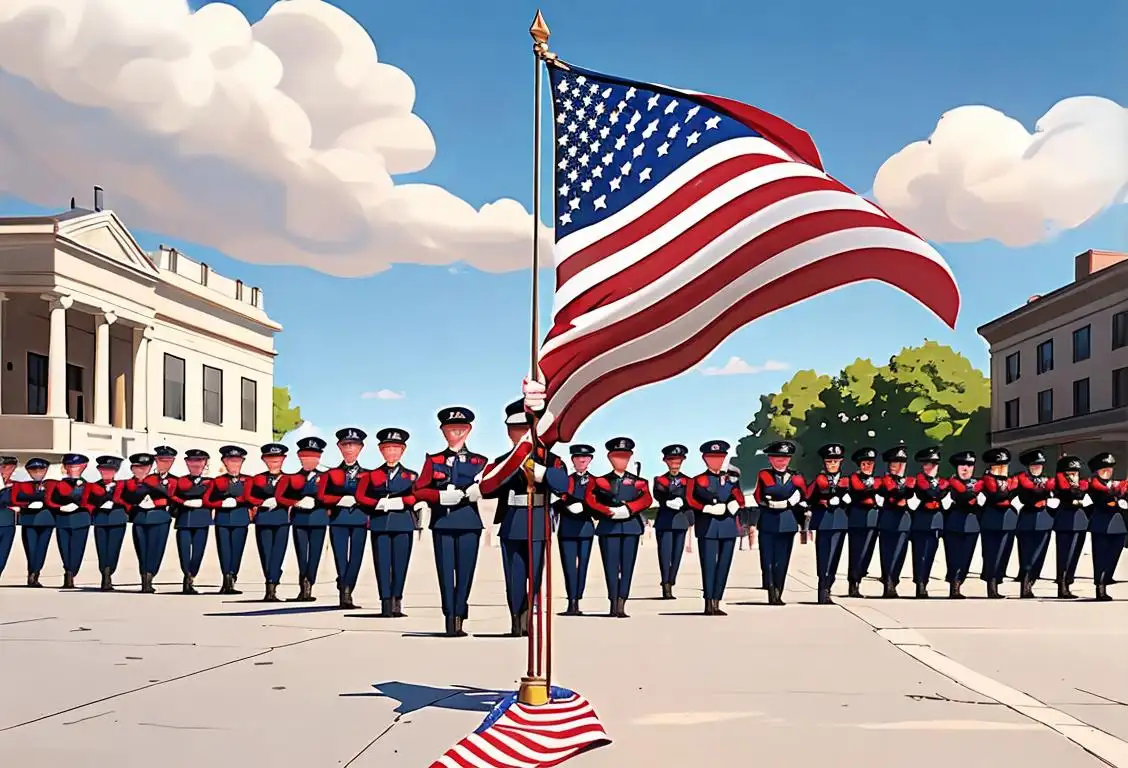National Hang Over Day

Hey there, party animals! Get ready to cure that pounding headache and regretful feeling because it's National Hangover Day!
When is Hang Over Day?
It's national hang over day on the 1st January.
The Origins of National Hangover Day
While most people are familiar with the experience of waking up after a night of good old-fashioned adult fun and finding themselves in a state of total disarray, National Hangover Day actually has its roots on the internet. This day emerged as a way for social media users to commiserate and share their own hilarious, embarrassing, and sometimes painful hangover stories.
The first mentions of National Hangover Day started popping up on January 1, 2016. The internet, being the magical place that it is, quickly embraced this peculiar celebration. People from all walks of life found themselves bonding over the shared struggle of waking up feeling less than stellar.
As the years went by, National Hangover Day gained more and more traction across various online platforms. It has become a day to laugh, commiserate, and to seek out remedies and tips to alleviate those post-party blues.
How to Celebrate National Hangover Day
Celebrating National Hangover Day is not about dwelling in the pain but rather finding ways to recover and take care of yourself. Here are a few suggestions:
- Hydration is key: Guzzle down that water, sports drink, or even a delicious smoothie to combat dehydration.
- Nourish your body: Treat yourself to a good meal with foods that are known to help alleviate hangover symptoms, such as eggs, avocados, and bananas.
- Rest and relax: Give yourself permission to have a lazy day. Curl up on the couch with your favorite TV show or movie, and let your body recuperate.
Remember, it's important to drink responsibly and know your limits to avoid being the star of your own hangover tales. Nothing ruins a good time quite like regret, so be mindful while having fun!
History behind the term 'Hang Over'
1600
The Initial Meaning
The term 'hang over' originally referred to the aftermath of a drunken episode. When someone drank too much, they would experience a feeling of heaviness or a lingering effect the next day. This concept of feeling physically weighed down later evolved into the metaphorical meaning we use today.
900 AD
The Origin
The term 'hang over' originated in the early 10th century, derived from the Old English word 'hangian', meaning 'to be suspended'. It referred to the feeling of being suspended between drunkenness and sobriety after consuming excessive alcohol the night before.
1904
The birth of the term
The term 'hangover' was first coined in 1904 as a compound word combining the verb 'hang' (meaning to suspend) and the noun 'over.' It was initially used to describe the physical consequences of excessive alcohol consumption, specifically the unpleasant symptoms experienced the day after indulging.
16th century
Origins of the term
The term 'hang over' originated in the 16th century and first appeared in literature in the play 'The Taming of the Shrew' by William Shakespeare in 1596. In the play, Petruchio mentions 'swing freely in the hangers' as a metaphor for hanging clothes. The term 'hangers' referred to the wooden beams on which clothes were hung, and 'hang over' was the act of draping or hanging an item. This term gradually evolved to describe the feeling of lingering effects after consuming alcohol.
1904
Frequent imbibing leads to regretful mornings
The term 'hang over' originated in 1904 to describe the unpleasant physical and emotional state one experiences after a night of excessive drinking. This term became prevalent during the Prohibition era in the United States when the consumption of alcoholic beverages was illegal. Hangovers were a common consequence of imbibing alcohol in secret speakeasies or consuming homemade concoctions of dubious quality.
1690
The term 'hang over' first appears in literature
The term 'hang over' was first documented in John Phillips' satirical poem 'The Splendid Shilling' published in 1690. The phrase 'hang over' was used to describe the residual effects of excessive drinking, often characterized by a feeling of physical discomfort and mental unease.
1560
The origins of 'hang over'
'Hang over' finds its roots in the phrase 'hanging over' which means remaining from a previous time or sticking out. The term was used in the 16th century but had a different connotation at that time.
1904
The Birth of 'Hang Over'
The term 'hang over' is believed to have originated in 1904. It referred to the uncomfortable physical and mental effects experienced the day after excessive alcohol consumption. The term 'hang' was used to describe the feeling of being suspended or weighed down by the aftereffects of drinking, while 'over' indicated the passage of time from one day to the next.
1894
The Phrase Gains Popularity
In 1894, the term 'hang over' began gaining popularity as a colloquial expression to describe the lingering after-effects of heavy drinking. It was commonly used to convey the sensation of a physical and mental discomfort experienced the morning after a night of excessive alcohol consumption.
1894
Printed Usage in Literature
The term 'hang over' gained recognition in literature. In George Ade's book 'Artie', published in 1894, a character is described as having 'a hang over' after a night of drinking. This marked one of the earliest instances of the term being used in writing, helping to solidify its place in popular culture.
1930
Early Popularization
During the 1930s, the term 'hang over' began to gain popularity and entered common usage. As alcohol consumption increased in society, the concept of experiencing a 'hang over' after a night of heavy drinking became more prevalent and relatable. It became part of colloquial language and was used to describe the physical and mental discomfort experienced after excessive drinking.
1904
Evolution of the term
The term 'hang over' gained popularity in the early 20th century, particularly in the United States. In 1904, the Oakland Tribune, a California newspaper, used the term 'hang over' to describe the aftereffects of excessive drinking. It referred to the feeling of being 'hung over' or 'hammared,' illustrating the concept of feeling heavy or weighed down, similar to how clothes hang over a hanger.
1938
Medical recognition
In 1938, 'hangover' gained recognition in the medical field. The term was officially included in the British Medical Journal, where it was defined as the 'after-effect produced by excessive indulgence in alcohol. Presenting symptoms include headache, nausea, and weakness.' This acknowledgment helped solidify the term's usage and establish it as a recognized phenomenon.
1897
The hangover gains medical recognition
In 1897, the term 'hangover' gained medical recognition when Dr. William James described it as a collection of symptoms that occur after heavy alcohol consumption. These symptoms include headaches, nausea, fatigue, and irritability. Dr. James attributed the term to a combination of the words 'hang' (referring to the lingering effects) and 'over' (indicating that the effects occur the day after).
1904
Hang over as a nautical term
Interestingly, the term 'hang over' had a different meaning before its association with excessive drinking. In nautical terminology, 'hang over' referred to the act of leaning or bending a sail or rope on the opposite side of the ship to counterbalance the weight. The term was later metaphorically applied to describe the feeling of imbalance and discomfort experienced during a hangover.
1894
From illness to excess alcohol
By the late 19th century, the term 'hang over' was associated with a medical condition. It was primarily used to describe the physical and emotional symptoms experienced after drinking too much alcohol. These symptoms often included headache, dizziness, nausea, and fatigue.
1950s
Popularity in the mainstream
During the 1950s, as alcohol consumption became more socially acceptable, the term 'hang over' gained prominence in mainstream culture. It became widely recognized as the aftermath of a night of indulgence, causing individuals to endure symptoms such as headache, dizziness, fatigue, nausea, and regret.
1954
The hangover becomes a cultural phenomenon
In 1954, the film 'The Hangover' was released, bringing the term into popular culture. The movie portrays a group of friends waking up after a night of heavy drinking in Las Vegas, trying to retrace their steps and recover their lost memories. The film's comedic approach to the aftermath of a wild night resonated with audiences and contributed to the further popularization of the term 'hangover.'
1954
Cultural impact and beyond alcohol
By the 1950s, the term 'hangover' had become widely recognized in popular culture. It was no longer solely associated with alcohol but also used metaphorically to describe the lingering effects of various experiences. For example, people started using it to describe the emotional aftermath of a difficult or exhausting event. This cultural expansion of the term showcased its adaptability and relatability beyond its original context.
1950s
Usage in Literature
During the 1950s, the term 'hang over' was widely used in literature to describe the aftermath of alcohol-induced indulgence. Famous authors like Ernest Hemingway and F. Scott Fitzgerald often referenced the term in their works, further solidifying its cultural significance.
1930
The Emergence of Hangover Cures
As the recognition and understanding of hangovers grew, so did the development of hangover cures. In the 1930s, various remedies such as the 'Prairie Oyster' (a concoction of raw egg, Worcestershire sauce, vinegar, and other ingredients) gained popularity as supposed remedies for hangovers. This period saw increased interest in finding ways to alleviate the unpleasant symptoms associated with drinking too much.
1950s
Widespread use
During the 1950s, the term 'hang over' became commonly used to describe the unpleasant physical and mental aftereffects of excessive alcohol consumption. As alcohol consumption increased, so did the use of the term. It became synonymous with feelings of fatigue, headache, nausea, and general discomfort experienced the morning after a night of heavy drinking. 'Hang over' became a cultural reference to the consequences of overindulgence.
1950
The Emergence of Hangover Cures
In the 1950s, various remedies and cures for hangovers started to appear. People sought ways to alleviate the unpleasant symptoms associated with hangovers, such as headaches, nausea, and fatigue. Folk remedies, as well as commercial products, claimed to provide relief from the effects of a 'hang over'. This marked the beginning of the recognition and acknowledgment of the term in relation to the consequences of excessive alcohol consumption.
1904
The first mention in literature
The term 'hang over' gained further recognition when it was mentioned in literature. In 1904, the Chicago Daily Tribune referenced it in an article titled 'Doctors Must Stop 'Hanging Over'.' This marked a significant step in popularizing the term.
1970s
Psychological Associations
In the 1970s, the term 'hang over' gained psychological associations. Researchers began studying the effects of excessive alcohol consumption on the body and mind, leading to a better understanding of the physical and cognitive symptoms experienced during a hangover.
2000s
Hangover remedies and commercialization
As the years passed, hangover remedies started flooding the market, ranging from herbal supplements to sports drinks specifically formulated to alleviate the symptoms of a hangover. This commercialization of hangover remedies highlights society's desire to find quick solutions to the discomfort caused by excessive alcohol consumption. Though no product can entirely eliminate the effects of a hangover, the pursuit of remedies continues to thrive in our modern age.
1970s
Further popularization
In the 1970s, the term 'hang over' gained further popularity and recognition through its portrayal in movies and TV shows. The depiction of characters having a 'hang over' after a night of partying resonated with audiences. This contributed to the widespread understanding and acceptance of the term as a common phrase in the English language.
1970s
Hangover remedies and folklore
As the understanding of the physiological effects of alcohol improved, people began exploring various hangover remedies. From consuming strong black coffee to taking aspirin, folklore around ways to prevent or alleviate hangovers grew. Scientific research debunked many remedies, but the fascination with finding a 'cure' for hangovers remained a part of popular culture.
1970
Cultural References in Media
During the 1970s, the term 'hang over' became firmly established in popular culture. It began to appear in literature, films, and television shows, often depicting humorous or exaggerated portrayals of characters suffering from the morning after effects of heavy drinking. This further solidified the term as a relatable and widely recognized concept.
1979
The hangover cure industry emerges
By the late 1970s, the hangover cure industry began to develop, offering various remedies and products claiming to alleviate the symptoms of a hangover. From activated charcoal pills to sports drinks infused with electrolytes, companies started catering to the needs of those seeking relief from the unpleasant aftermath of excessive alcohol consumption. The market for hangover cures continues to grow, reflecting society's ongoing fascination with preventing or lessening the effects of hangovers.
1954
The Phrase Goes Mainstream
The term 'hang over' became more widely recognized and entered mainstream usage. It was integrated into the English language, often used to describe the uncomfortable physical and mental state experienced after excessive drinking. Its popularity in everyday conversation solidified its place in popular culture and ensured its longevity.
1930s
Cultural adoption and acceptance
During the 1930s, 'hang over' became more widely recognized and accepted as part of popular culture. It was increasingly mentioned in newspapers, magazines, and films, solidifying its place in everyday language.
2020
Global Popularity
In the modern era, 'hang over' has become a universally understood term, recognized and used across the globe. Its usage no longer limited to the English language, variations of the term exist in different languages and cultures. 'Hang over' has become an integral part of social celebrations and serves as a reminder of the potential consequences of excessive alcohol consumption.
Present day
Modern usage
Today, 'hang over' is a universally recognized term used to describe the physical and mental symptoms experienced after consuming excessive amounts of alcohol. It has become an integral part of popular culture and is often associated with a night of revelry and the need for recovery the next day. The term has even been extended beyond alcohol-related aftereffects to describe the lingering effects of indulgence in other substances or activities.
2000s
Cultural Shift in Attitudes
In the 2000s, there was a cultural shift in attitudes toward excessive drinking and the consequences of hangovers. While previously seen as a badge of honor, hangovers started to be viewed as negative and associated with poor decision-making. This change in perception led to increased awareness campaigns about responsible alcohol consumption and the importance of avoiding hangovers.
2021
Hangover self-care and prevention techniques become popular
In recent years, there has been a significant focus on hangover self-care and prevention techniques. From hydrating before and during alcohol consumption to consuming certain foods and supplements, individuals are actively seeking ways to mitigate the effects of hangovers. Wellness trends and the growing interest in holistic health have contributed to the exploration of natural remedies and strategies to prevent or manage hangovers.
2009
The hangover movie franchise
In 2009, the film 'The Hangover' was released, marking a significant cultural milestone for the term. The movie, and its subsequent sequels, humorously depicted the outrageous adventures and misadventures of a group of friends waking up from a night of heavy partying with no memory of what had happened. The popularity of the film further embedded 'hangover' in modern-day slang and pop culture.
1980s
Recognition in Medical Journals
Medical journals started recognizing 'hang over' as a legitimate medical condition in the 1980s. These publications explored the physiological processes behind hangovers, including dehydration, electrolyte imbalances, and inflammation, contributing to the recognition of the term in the medical community.
1950s
The modern definition
In the 1950s, the term 'hang over' took on its modern definition, referring specifically to the aftereffects of excessive alcohol consumption. It became a commonly used term to describe the unpleasant physical and psychological symptoms experienced the day following heavy drinking.
Present Day
Cultural Acceptance
Today, the term 'hang over' has become deeply embedded in popular culture. It is widely recognized and understood to describe the physical and mental discomfort experienced after excessive alcohol consumption. The concept has also extended to include the after-effects of indulgence in other substances or overindulgence in activities.
Present
Continuing relevance
Today, 'hang over' is a well-established term in popular culture, and its usage extends beyond alcohol-induced consequences. It has become synonymous with the feelings of exhaustion, regret, and discomfort following any excessive activity, representing the enduring impact this term has had on contemporary language.
Present
Ongoing Research and Hangover Prevention
Today, the understanding of 'hang over' extends beyond the cultural impact. Scientists and researchers continue to study the causes and effects of hangovers. Efforts are being made to find effective preventive measures and develop new treatments to alleviate the discomfort associated with excessive drinking, contributing to the overall well-being and promoting responsible alcohol consumption.
Did you know?
Did you know that the term 'hangover' dates back to the 19th century? It was originally used to describe the side effects of excessive drinking, such as the feeling of being 'hung-over' a ledge. Talk about a visual!Tagged
nsfw fun rememberanceFirst identified
5th July 2015Most mentioned on
1st January 2016Total mentions
172Other days
Commemoration Day
Latino Aids Awareness Day
Opposite Day
Children Day
Guard Will Be Placed On A Day
Whine Day
Stormy Daniels Day
Happiness Day
One Day
Personal Safety Day









